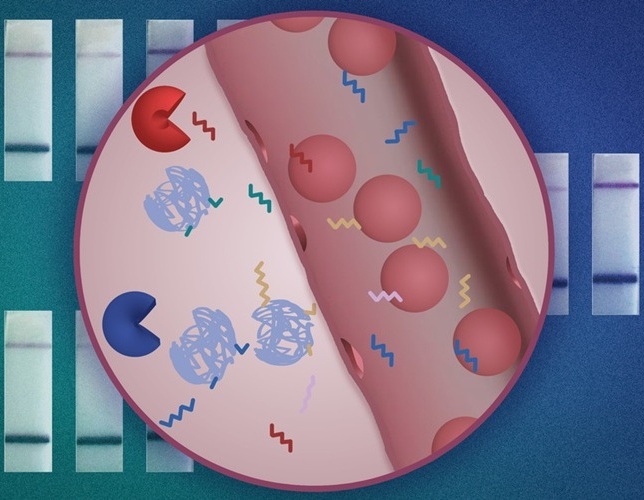Simple Paper Test Offers Early Cancer Diagnosis
Posted on 04 Jun 2025
Diagnosing cancer at an early stage remains a significant clinical challenge, particularly in resource-limited settings where access to advanced testing equipment is scarce. Conventional detection methods often struggle to identify cancer-related biomarkers at low concentrations, especially in the early phases of disease. Now, a team of engineers has developed a novel nanoparticle-based sensor that can detect cancer through a simple urine test, offering a potentially affordable, accessible, and rapid diagnostic solution.
The new diagnostic system developed at Massachusetts Institute of Technology (MIT, Cambridge, MA, USA) relies on nanoparticles engineered to respond to tumor-specific enzymes. When these particles reach a tumor, they release short DNA sequences—known as “barcodes”—into the bloodstream, which are later excreted in urine. These DNA barcodes can then be analyzed using a paper-based test strip, similar to at-home COVID-19 tests, using CRISPR technology. A dark line appears when a specific barcode is detected, signaling the presence of cancer-related enzyme activity. To protect the barcodes from degradation in the blood, the researchers used a phosphorothioate modification—a method already applied in stabilizing modern RNA vaccines. Each DNA barcode is linked to a nanoparticle by a cleavable linker responsive to a specific protease—enzymes involved in tumor progression. Once released, the barcode circulates and is ultimately excreted in urine.

The researchers used two types of nanoparticles: one based on FDA-approved polymers and another built from nanobodies—antibody fragments that home in on tumors. The test was designed for multiplexing, meaning it can detect multiple enzyme activities in a single sample, improving both sensitivity and specificity. In research published in Nature Nanotechnology, the scientists used mouse models to demonstrate that five DNA barcodes could accurately distinguish between tumors originating in the lungs and colorectal cancer that had metastasized to the lungs. Additionally, the team designed a microfluidic chip capable of reading up to 46 different DNA barcodes from one sample. These capabilities suggest the test could eventually classify cancer types, monitor treatment responses, and detect recurrence. The broader goal is to make the test scalable and suitable for use in humans. Phase 1 clinical trials conducted of an earlier version of the urinary diagnostic particles has demonstrated their safety in patients.
“We are trying to innovate in a context of making technology available to low- and middle-resource settings,” said MIT scientist Sangeeta Bhatia. “Putting this diagnostic on paper is part of our goal of democratizing diagnostics and creating inexpensive technologies that can give you a fast answer at the point of care.”














